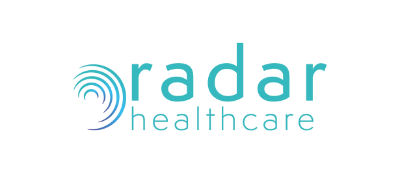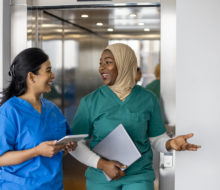Employee takeover: Learning, innovation, and the future of healthcare with Molly Kent
09 December 2022
Tags:
 We pride ourselves on supporting healthcare organisations to improve their services, but how much do you know about the people behind the product?
We pride ourselves on supporting healthcare organisations to improve their services, but how much do you know about the people behind the product?
Molly Kent was recently promoted from National Business Development Manager (NHS) to our Strategic Sales Lead at Radar Healthcare. Molly has spent many years working alongside NHS organisations, Trusts, and professionals to make tangible improvements across all clinical, corporate, and governance areas.
Join us for a quickfire Q&A round to hear Molly’s thoughts on healthcare’s hot topics.
Hi Molly! Firstly, congratulations on your promotion to Strategic Sales Lead, it was very well deserved. Can you tell us a little about your new role at Radar Healthcare and why building strong partnerships are so important?
“Thank you! Yes. So, I was promoted to the Strategic Sales Lead this year and I am now heading up the Public Sector Team. It is a really exciting role and time for the Sales team (and wider business) because there is so much happening, whether that be events, new partnerships and opportunities, external projects, or internal growth.
We, as a team, are very proud of the work we do, and our partnerships are the reason we work so hard. We can really see the difference and impact that our innovative product and service are making on Trusts and organisations within the industry. The goal now is to continue developing those strong relationships to help the NHS even further and ensure our partners are using Radar Healthcare as that cornerstone for continuous improvement.
Currently, we are partnered with lots of different NHS Trusts and organisations, with over 10,000 locations across the globe. We are always making sure we are ahead of the game and listening to what is going on within the industry to be reactive and meet all our partner’s needs, to not only deliver the best solution but the best partnership as well.”
You’ve attended a host of events over the year, including, but not limited to Patient Safety Congress, Health Plus Care, and Public Policy Projects’ ICS Roadshows, as well as some more lined up. Could you tell us a little more about the importance of those for our partnerships?
“Yes, and the award ceremonies, and so many networking events. We were also at the Health Innovation Consortium launch event at the House of Commons earlier this week.
Events are a brilliant opportunity to not only learn more about what is going on within the sector and understand those evolving sector demands but also talk about our partners and their fantastic achievements with Radar Healthcare.
At Patient Safety Congress, we were lucky enough to be joined by Paul Cresswell from North Bristol NHS Trust to discuss how by harnessing digital methods they are able to join up systems and processes to facilitate real learning and improvement. And we also invited HC-One’s Antony Hall to speak with our Head of Sales, Simon Qasir, at Health Plus Care about how they put residents at the heart of everything. It is a chance to hear from our partners and understand how they are using the software, again so we can learn and continue to innovate and accommodate their needs, as well as give live examples to audiences of the impact that Radar Healthcare can make for healthcare organisations.”
You have just mentioned that you recently attended Public Policy Projects’ ICS Roadshow; do you have any highlights from the series of events?
“The ICS Roadshows were extremely insightful, and it was great to be a part of those panel discussions and conversations.
I think Integrated Care Systems are particularly interesting as it is a new area within the industry for everyone. It is a fantastic opportunity to take stock of what is happening, look at these new models of care, and consider things like LFPSE and PSIRF to shift the dial and take a very proactive and innovation-driven approach toward how we focus on patient safety.
We have already got a lot of experience working within the ICB model from all the work we do with our partners. From a technological perspective, we are very proud and excited to be able to underpin those elements and it is super exciting to see how technology again the bedrock for all these new movements can be to take shape.
I think what has particularly stood out over the course of the events, are the possibilities of interoperability. It isn’t a new term, it is something that has been talked about in the NHS for over a decade, but I think the right conversations are finally being had to underpin what this actually means and how it could work.
Historically, I think people have thought that care is something that happens to you, not something you necessarily have involvement in. I think now people are realising we are all patients and ultimately it is important to give people agency in their own care journey and understand a bit more about these other factors that are causing ill health – and technology has a huge role to play in that.
Certainly, from a digital point of view, interoperability is not only about integrating software to share data but also reviewing how teams work with one another and looking at how we can provide high-quality and useful information and data to the right people at the right time through automation.
We’re definitely starting to see our partners using Radar Healthcare not just to underpin the requirements of their particular organisation but also when they are looking at the wider parameters of the place and considering how they can really deliver innovative, high-quality, patient-centered care.”
With LFPSE (Learn from Patient Safety Events) and PSIRF (Patient Safety Incident Response Framework) due for implementation in 2023, what advice would you give to organisations to make sure they have the right partnership in place to achieve these deadlines?
“Look at suppliers and ask questions. What is their experience? What is their track record? Do they have the knowledge, expertise, and tools to not only meet the requirements now but also have that horizon and capability to spot-check and be flexible to upcoming changes and trends?
What else is really critical, from an organisational perspective, is to look at the bigger picture. In the past, there has been a culture of seeing a problem and trying to fix it with a technological solution that fixes that isolated problem, rather than zooming out and considering how they can connect the dots and achieve a wholesale change.
I think that organisations need to try not to feel pressured and take the time to speak to the supplier’s existing customer base to understand what kind of partnership approach they have. Overall, I would recommend looking for a supplier that is agile, focuses on longevity, and builds a high-trust relationship whilst encouraging you to deliver better care.
We are very proud to say that Radar Healthcare was first out of the gate to be an LFPSE-compliant supplier and then the first organisation to be working alongside an NHS Trust to go live with LFPSE. Radar Healthcare is very on top of the national programs of work and is actively engaged with them across the NHS. Take PSIRF, for example; the principles are already heavily embedded within the system because of the way that the product is designed.”
Finally, as an industry expert, what do you think the future of healthcare looks like?
“What I will say won’t come as a surprise to many healthcare professionals. I think we are seeing a transition away from a reactive model to a much more proactive model of care, which certainly concerns and focuses more on patient safety and quality improvement.
It is clear to see a real shift toward learning. We can definitely see that the NHS has had a real attitude toward dynamic change, and we saw a lot of that throughout the pandemic. COVID-19 really emphasised how agile healthcare services can be, and need to be, and taught us the importance of aligning data, in order to spot trends, address risks, embed a culture of learning, empower staff, and fundamentally improve care experiences.
From a technological and digital perspective, I think we will continue to see the rise of AI, machine learning, the Internet of Things, data-driven events, and so on, to use data in more interesting, useful, and innovative ways – particularly in ways when it comes to engaging patients.
When we think about a digital revolution we need to think about individual needs and circumstances. There is enough software and research out there to engage and monitor patients better and assess their welfare in ways that work for them.
Some interesting work we are doing at Radar Healthcare, for example, is really focused on wearables that integrate with devices to monitor the well-being of patients and to focus on that preventative model.
It is evident that there is some learning and improvement to be done as a whole, certainly when we focus on better use of data. I want to see better integration of processes as well as systems, with organisations looking at the full lens of all the elements that fall underneath the umbrella of patient safety, quality, and compliance – and Radar Healthcare is in a great position to support NHS organisations and Trusts with this shift.”
Listen to our CEO Paul talk about new tech
Any other comments?
“Myself and my team are always interested in hearing people’s thoughts on technology and what would make an impact on the challenges they are facing. We’re keen to speak with as many people within the industry as possible if nothing more than for a chat, especially people reading this that are wanting to engage in a conversation.”










